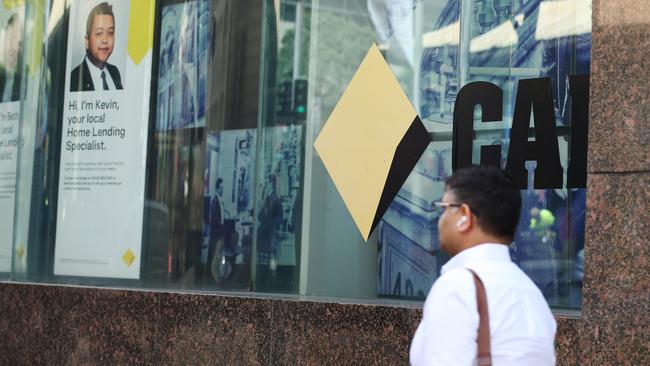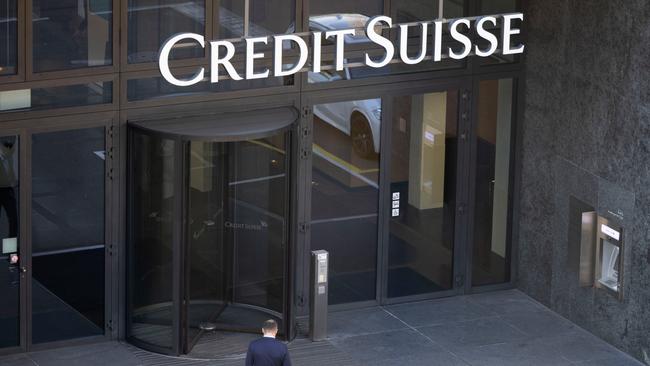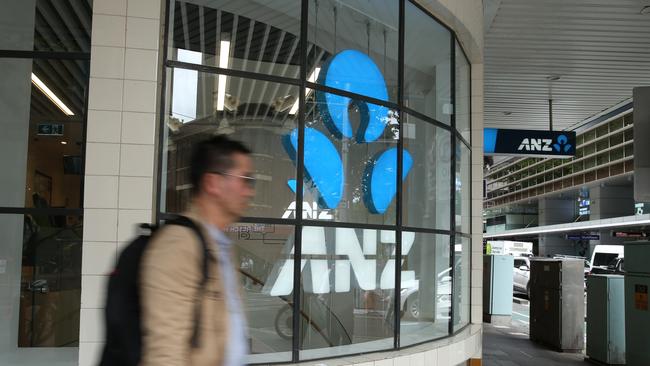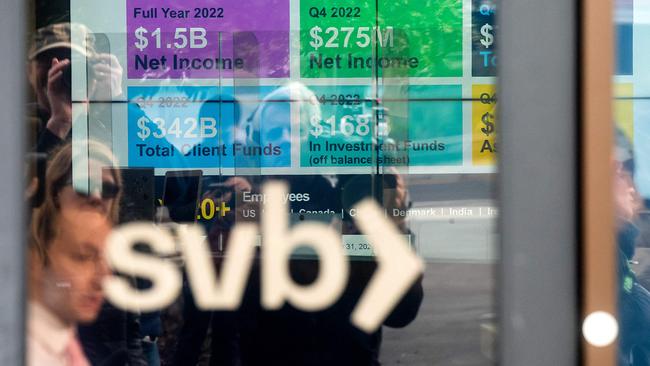Banks play waiting game over ‘freeze’ from stressed money markets
Australia’s big four banks were highly active in global money markets through summer to get on top of their funding needs.

Business
Don't miss out on the headlines from Business. Followed categories will be added to My News.
Through sheer luck Australia’s big four banks were active in global money markets through January and February, raising billions of dollars to fund their lending books managing to avoid the US banking crunch that has kept markets in a semi-freeze in recent weeks.
This means that two-thirds of their funding needs for this year have been locked away with some already getting a good head start for next year.
For mortgage customers this means the pressure will be off banks for now around pushing through additional rate hikes beyond the Reserve Bank or winding back discounts on new loans. But if US-led market disruption keeps going for several months this pressure will come back.

Australian banks were already flush with cash through Covid-19 with deposits making up a whopping 75 per cent of their funding book. Consumers were stuck at home unable to spend money in big way as the stimulus funds kept flowing and flush with cash this meant banks had little need to return to global markets for funds.
Now that high savings levels are being drawn down, with spending back on and inflation pushing up all kinds of costs banks are seeing deposit levels returning back to more normal levels.
Before the global financial crisis hit the deposits sitting in the big four bank’s vaults made up around 45 per cent of their lending books, meaning Australia was forced to import substantially more capital to grow.
But Australian banks have been working hard over the past decade to source more funds from local deposits, meaning they are less reliant on swings in money markets. Before the pandemic deposit funding was running above 65 per cent and in some cases higher.
Bank treasurers since the demise of Silicon Valley Bank, combined with new stresses in Europe mean there has been no major issuance of bank debt in the past two weeks. Now it’s a waiting game waiting until markets start functioning normally which could be weeks away. They expected issuance will happen slowly at first and then there will be a rush of deals when markets find their feet. Australian banks also have options beyond global markets with the local BBSW market highly liquid as well as private placements to cashed-up super funds.
The other focus is the Reserve Bank’s ultra-cheap term funding facility which expires in two tranches the first coming up at the end of June. The big banks say they are less concerned about this because they have factored it into their annual funding needs and don’t see this as an additional funding demand. CBA’s repayment under the first tranche of the facility is $19bn; NAB $14.3bn, Westpac $17.3bn and ANZ $12bn.

However one pressure point for the big banks is shaping up to be $20bn of subordinated debt that needs to be issued under new rules introduced by the Australian bank regulator APRA to make what it calls “domestically systemically important” banks even safer.
Here each of the four major banks are required to issue billions of dollars of additional debt under rules to bulk up their so-called tier two capital.
This debt is hybrid in nature, it takes losses after “safer” tier one debt but has the trigger where it can convert to ordinary equity if regulators deem that a bank is not viable. This would have the impact of wiping out any value which is what happened in Credit Suisse’s case – although that was linked to $US17bn of Credit Suisse’s tier one debt instruments. That move up-ended the natural order given Credit Suisse shareholders still emerged with a little more than US80c in the dollar while debt investors were wiped out.
While local investors will understand the difference between Swiss and other regulations, these subordinated instruments will be harder sell to international investors given fallout from the Credit Suisse decision. The APRA rules aren’t due to come in until the start of 2026 but banks have already been making a move on their tier two instruments.
Regulatory short attack
Hit and run short attacks need to take on big targets to make a splash.
And in turning its attention to Jack Dorsey’s Block New York-based Hindenburg research has gone after one of tech’s high-profile names. Several years ago Twitter founder Dorsey decided to put the troubled social media site behind him to focus on where the real cash lies – the payments system.
Hindenburg’s claims of Block inflating its customer base and facilitating criminal behaviour through its payment network have given the fintech that also owns Afterpay a hell of a knock. Block’s ASX-traded shares are down almost 20 per cent since the report’s release early on Friday. But if the claims are proven, the real collateral damage here will be US regulators overseeing Block’s activities.
Hindenburg, founded by activist short seller Nathan Anderson, has been buoyed by the $US100bn ($150bn) hit it delivered to Indian flag-bearer Adani Group last month that is still playing out.

While Hindenburg’s latest allegations have not been tested, it has certainly raised some important questions about Block’s Cash App payments platform and whether it turns a blind eye to criminal use.
Block will need to hit back on how it is monitoring possible fraud, illegal payments and complying with anti-money laundering rules in the markets it operates. This will be essential if it wants to roll out its Cash App into Australia. Dorsey’s next scheduled event with Block isn’t until early May when the first quarter results are due which is too long.
What Hindenburg has done – intentionally or not – is to seize on the bigger debate of massive regulatory gaps in the US and whether oversight is keeping pace with a rapidly changing economy.
This is at the heart of the stresses emerging across some US regional banks including the demise of Silicon Valley Bank and Signature Bank both reported to a patchwork of state and federal regulators. There no one was looking at the bigger picture around the risks on the balance sheet.
Mobile payments
Hindenburg's claims centre around Cash App that allows for peer-to-peer payments using a mobile app that it claims can be used by criminal elements. The service is in use across the US and United Kingdom and in December alone it processed a record 51 million transactions and processed more than $US200bn over the past 12 months.
Block’s Cash App facilitates transactions on Bitcoin, stocks, cash deposit from a debit card or even a paycheck. The anonymous nature of cash exchanges – think of a WhatsApp for payments – should already put it right near the top of the regulatory hit list. If there are clear issues what has been done about it.
Hindenburg says Block’s “Wild West” approach to compliance makes it easy for “bad actors”. Block dismissed Hindenburg’s claims as “factually inaccurate” and “misleading”. It has also threatened legal action against the short seller.
Block already has comprehensive oversight, but like US banks this is through a complex web. Regulators include the SEC, the US Financial Industry Regulatory Authority; US deposit insurance agency FDIC; Consumer Financial Protection Bureau; as well as a swag of state and law enforcement agencies and for its banking arm the Utah Department of Financial Institutions. Each one is responsible for a small part of Block’s business.
Much of the untested claims raised by Hindenburg fall under the watch of the US Department of Treasury’s Financial Crimes Enforcement Network (which also counts local and state enforcement agencies). Any shortfalls by Block – if proven – should result in hard questions for the respective regulators.

Block has ambitions for Cash App to extend to Australia. The parent company and Afterpay already falls under Australian anti-money laundering rules including feared financial crimes regulator Austrac. Indeed Austrac has shown a willingness to pursue tech companies where it needs to. It recently extracted an enforceable undertaking from eBay-backed PayPal and at the other end of the scale Austrac has shown its willingness to go in hard. It has extracted a combined $2bn penalties from Commonwealth Bank and Westpac for allowing their systems to be used by criminals. Casino’s Crown and Star City also face damaging legal action from Austrac.
In chasing headlines, Hindenburg misses the real questions around Block, including the slowing performance of Afterpay as the entire buy now, pay later sector sinks. This means the $US12bn of goodwill sitting on Block’s balance sheet from the buyout is increasingly at odds with the reality of the broader market. Hindenburg’s focus on Afterpay is limited to the looming regulatory crackdown although that was well flagged in the merger scheme booklet released at the end of 2021.
Hindenburg also misses the $US3.5bn sitting on Block’s balance sheet in US Treasuries, money market funds and other securities that are subject to swings in interest rates. In the current climate how these funds are valued are worth a deeper dive.
However if there is any substance to Hindenburg’s claims, Dorsey’s battle won’t be with short sellers but with payments regulators that have been shown up.
Originally published as Banks play waiting game over ‘freeze’ from stressed money markets



